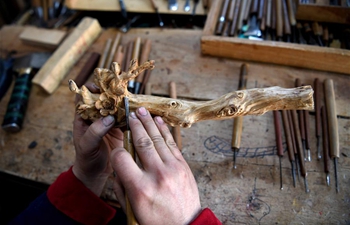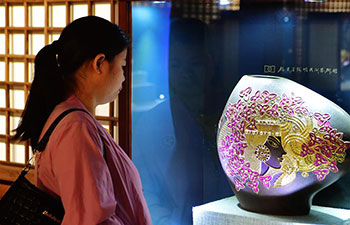ROME, April 12 (Xinhua) -- For the first time ever, Italy will allow a "linguistic certification" on Latin language this year, meaning students can be formally tested and certified for their proficiency in the language.
Little is known about details of the certification process, which was given the green light only this week. It will be part of the Common European Framework of Reference for Languages, a measure that until now had only ever been applied to living contemporary languages. The process will become clearer later in the year and will enter into effect since the 2019-2020 school year.
For centuries, Latin was one of the most important languages in Europe, but later was reduced to traditional roles in religious ceremonies, jurisprudence and scholarly pursuits.
"By most measures, the last time Latin was a vibrant, significant, living language was during the 1700s," Giorgio Piras, director of the Department of Sciences of Antiquity at Rome's La Sapienza University, told Xinhua recently.
Piras said Italy's decision comes at a time when interest in Latin language at the university level is also on the rise.
"There are almost a thousand students in Latin courses at La Sapienza, and each year there are around 150 more than the year before," the professor said. "Technically, it's still a dead language because it's not a spoken language. It will never again be a widely-used language as it was in classical times, but interest is on the rise."
Piras said students are drawn to the ancient language for a variety of reasons: as a way to access a large portion of the western literary canon in its original language, for example, or as a way to deepen their understanding of the modern languages that evolved from Latin.
He added the linguistic certification in Latin could prove to be a way for students to illustrate their capacity to master difficult challenges.
"I cannot say why this growing interest is happening now instead of 10 or 20 years ago, but it is happening," Piras said.
According to Eric Hewett, executive director of the Paideia Institute, an educational entity that focuses on teaching and promoting classical languages, Latin can act as a kind of "cultural tool that provides direct access to a vast storehouse of humanistic studies."
The Paideia Institute, which was founded in 2010, draws students from Europe, the United States and beyond. While Hewett said economic factors can have an impact on enrollment with the institute, he said interest in the language -- at least based on his experience with Paideia -- is robust.
Still, Hewett said the long-term growth of Latin will be limited by one main factor that makes it more difficult than modern languages.
"There is no place a student can go where he or she can be surrounded by it," he said. "A student studying French ...or English can go to that country and dramatically speed up the learning curve. For Latin, the best available option may be something small like one of the handful of Latin speaking events we host at Paideia."













